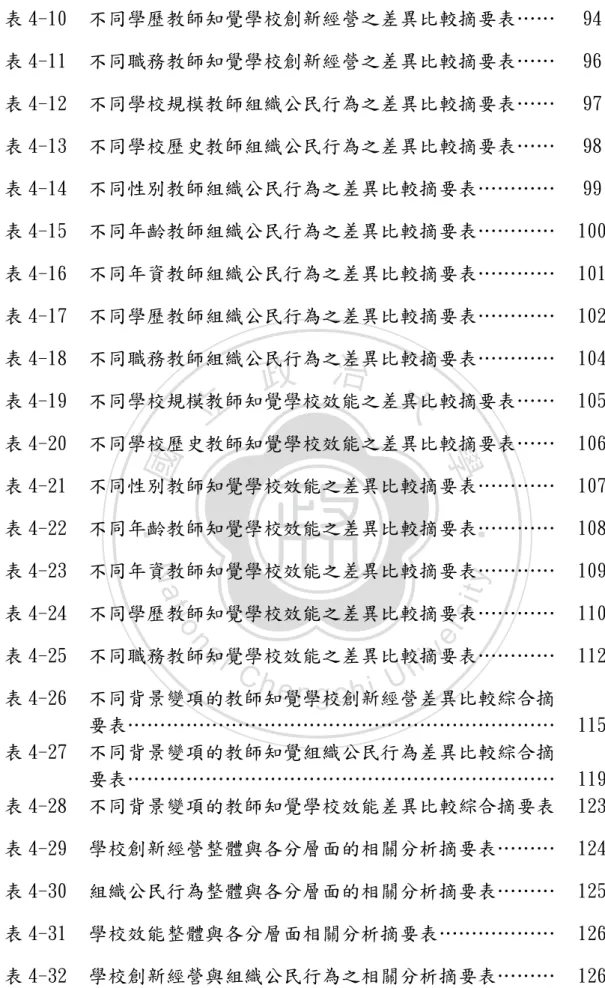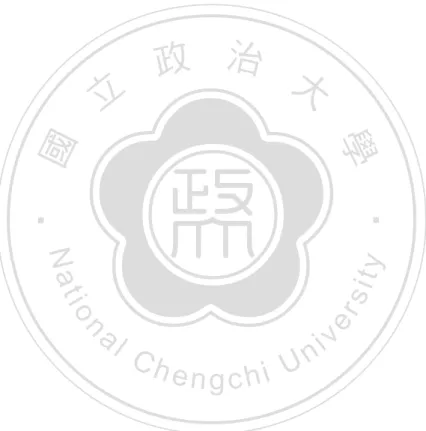新竹地區國民中學學校創新經營、教師組織公民行為與學校效能關係之研究 - 政大學術集成
全文
(2) 謝 誌 三年政大的學習日子,隨著論文的定稿即將告一段落,很高興能在人 文氣習濃厚,師長學養豐富的環境裡持續我的終身學習歷程。 本論文能夠順利完成,首先要感謝指導教授秦夢群博士,不但認真教 導治學態度,更持續對學生關心、鼓勵與支持,教授嚴謹的自我要求不但 讓我在學習的歷程裡欣賞悠遊,也使在工作上的做人處事有更大的進步與 體會。口試委員陳嘉成教授及鄧鈞文教授,在假日期間為論文審閱,給予 指正寶貴意見,使我獲益良多,論文更加完善,致上最誠摯的敬意與謝意。 感謝所裡的老師:湯志民教授,吳政達教授、林邦傑教授、余民寧教 授、張奕華教授、胡悅倫教授、王鍾和教授…等師長的指導與殷切叮嚀, 讓我對學校行政的各向度有最好的學習。感謝同組學伴添唐、明宜及振良 的相互鼓勵及提携,在撰寫論文過程中是最佳的活力來源。當然還要感謝 第九屆學行碩的同窗好友們,三年同學,有學習、有玩樂、有計畫、有隨 性,除了台灣的各個學校和景點,日本、沙巴也都留著滿滿的回憶,祝福 為教育理想而努力不懈的好友們--心想事成。 最後,感謝我最親愛的家人和所有關心我的人,支持與關愛一直都是 使我往前走的最大動力。論文完成代表又是另一階段的開始,未來在教育 崗位上,我仍將繼續實踐自己的理想,也將持續我的終身學習之旅。謹將 本論文獻給我親愛的家人、指導我的師長及關心我的朋友,並將喜悅和大 家分享。. 李玉美 謹誌 中華民國九十九年六月 ii.
(3) 新竹地區國民中學學校創新經營、 新竹地區國民中學學校創新經營、教師組織公民 行為與學校效能關係之研究 摘 要 本研究旨在探討新竹地區(新竹縣、市)國民中學學校創新經營、組 織公民行為與學校效能之關係。研究採調查研究法,共計抽樣 25 所學校, 發出 650 份問卷,回收 560 份有效問卷,回收率為 86%。資料處理分 別以描述性統計、t 檢定、單因子變異數分析、積差相關、迴歸分析等統 計方法進行統計分析。 本研究獲致下列之結論: 一、國中教師對整體學校創新經營現況知覺程度為中上,其中以「資訊科 技創新經營」感受最佳,「外部環境創新經營」則仍有待努力。 二、國中教師對整體組織公民行為之現況感受為中上程度,其中以「不爭 利營私」最受重視, 「認同組織」則有待加強。 三、國民中學整體學校效能的現況尚稱良好,其中以「教師專業成長」最 受重視, 「社區認同支持」則有加強的空間。 四、 「學校歷史」是影響學校創新經營、組織公民行為與學校效能的重要 背景變項,創校 10 以內的學校表現較佳。 五、 「性別」是影響學校創新經營、組織公民行為與學校效能的重要背景 變項,男性普遍高於女性。 六、 「年資」是影響學校創新經營、組織公民行為與學校效能的重要背景 變項,新進 5 年以內的教師表現較佳。 七、 「學歷」是影響學校創新經營、組織公民行為與學校效能的重要背景 iii.
(4) 變項,一般大學畢業的教師表現普遍較高。 八、 「職務」是影響組織公民行為與學校效能的重要背景變項,兼任行政 教師普遍較高。 九、 「年齡」是影響組織公民行為的重要背景變項,41 歲以上的教師表現 普遍較佳。 十、國中學校創新經營的情況愈佳,教師組織公民行為的情形也愈佳。 十一、國中學校創新經營的情況愈高,則學校效能愈佳。 十二、國中教師組織公民行為愈高,則學校效能也愈佳。 十三、學校創新經營對學校效能具有預測力,而且以行政管理最具預測力 十四、組織公民行為對學校效能具有預測力,而且以認同組織最具預測力 十五、學校創新經營與組織公民行為對學校效能具有預測力,且以分層面 「行政管理創新經營」的預測力最佳。 依據研究之結論,研究者提出具體建議,以供學校及教育行政機關後 續提昇學校效能之可行做法,以及未來相關研究之參考。 一、強化資訊網路系統、鼓勵知識分享,以提升學校效能。 二、營造和諧的校園氣氛,公開表揚教師的組織公民行為。 三、重視教師專業成長,確保學校效能的展現。 四、肯定女性教師,提供更多校務參與機會。 五、鼓勵教師參與行政工作,深度認識加強認同。 六、鼓勵勇於創新與改變,營造正向的創新校園。 七、加強教師組織公民行為,對學校的認同,以提昇學校效能。 八、加強與社區互動,爭取社區成員的認同支持。. 關鍵字: 關鍵字:學校創新經營、 學校創新經營、組織公民行為、 組織公民行為、學校效能. iv.
(5) A Study on Relationships between School Innovative Management and Teacher’s Organizational Citizenship Behavior and School Effectiveness of Junior High Schools in Hsin Chu County and Hsin Chu City Abstract The purpose of this study is to explore the relationships between school innovative management and teacher’s organizational citizenship behavior and school effectiveness of junior high schools in Hsin Chu County and Hsin Chu City. Questionnaire survey method is adopted. The samples include 25 schools and 650 questionnaires were distributed. There were 560 valid questionnaires used finally in the statistic analysis and the usable rate is 86%. All data collected were analyzed by the methods of descriptive statistics, independent t-test, one-way ANOVA, Pearson correlation, Multiple regression etc. The conclusions are as follows: 1.The current states of school innovative management in junior high school are good. Comparing all dimensions, “information and technology ” is the best; “exterior relationship” is the worst. 2.The whole performance of teacher’s organizational citizenship behavior is good. Among the sectional scores, “the dimension of non-benefit-orientated” is the highest. 3.School effectiveness shows medium-high level, especially “the professional development of teachers.” 4.The “school history” is the most important environment factor to affect school innovative management and teacher’s organizational citizenship behavior. 5.The “gender” is the most important background factor to affect school innovative management, teacher’s organizational citizenship behavior and school effectiveness. 6.The “years of service in education” is the most important background factor to affect school innovative management, teacher’s organizational v.
(6) citizenship behavior and school effectiveness. 7.The “highest of educational diploma” is the most important background factor to affect school innovative management, teacher’s organizational citizenship behavior and school effectiveness. 8.The “position of teacher” is the most important background factor to affect teacher’s organizational citizenship behavior and school effectiveness. 9.The “age” is the most important background factor to affect teacher’s organizational citizenship behavior. 10. The better the school innovative management will be, the more the teacher’s organizational citizenship behavior will be. 11.The higher the level of school innovative management is, the higher level of school effectiveness will be. 12. The more the organizational citizenship behavior will be, the higher the school effectiveness will be. 13. The school innovative management can predict the school effectiveness, and “administration and management” is the primary predictable variable. 14. The teacher’s organizational citizenship behavior can predict the school effectiveness, and “the identifying oneself with the organization” is the primary predictable variable. 15. The school innovative management and the teachers’ organizational citizenship behavior can predict the school effectiveness, and “administration and management” is the primary predictable variable. Findings and conclusion in this research could be used as a reference for sahool,board of education and researchers to promote practice in operation and future research. Keywords: school innovative management, organizational citizenship behavior, school effectiveness. vi.
(7) 目 錄 第一章 第一節 第二節 第三節 第四節. 第二章 第一節 第二節 第三節 第四節. 第三章 第一節 第二節 第三節 第四節 第五節. 第四章 第一節 第二節 第三節 第四節. 緒論…………………………………………………………1 緒論 研究動機與目的…………………………………………1 待答問題與研究方法………………………………………4 名詞釋義……………………………………………………5 研究範圍與限制…………………………………………8. 文獻探討……………………………………………9 學校創新經營之理論與相關研究………………………9 組織公民行為之理論與相關研究………………………24 學校效能之理論與相關研究……………………………39 學校創新經營、組織公民行為與學校效能之相關研究 67. 研究設計與實施… 研究設計與實施 … ……… … … … …… … …… … … 73 研究架構……………………………………………………73 研究假設……………………………………………………75 研究對象……………………………………………………76 研究工具……………………………………………………79 資料處理……………………………………………………81. 研究結果與討論… 研究結果與討論 … ……… … … … …… … …… … … 83 國民中學學校創新經營、組織公民行為與學校效能之現況分 析………………………………………………………………83 不同背景變項教師知覺學校創新經營、組織公民行為及學校 效能之差異分析………………………………………………87 國民中學學校創新經營、組織公民行為及學校效能之相關 分析……………………………………………………………124 國民中學學校創新經營、組織公民行為對學校效能之預測 分析……………………………………………………………131. vii.
(8) 第五章 第一節 第二節. 結論與建議……………………………………………147 結論與建議 結論…………………………………………………………147 建議…………………………………………………………154. 參考文獻………………………………………………………………158 參考文獻 壹、中文部分……………………………………………………………158 貳、英文部分……………………………………………………………169. 附錄……………………………………………………………………173 附錄 附錄一. 新竹地區國民中學學校創新經營、教師組織公民行為與學 校效能關係調查問…………………………………………173. viii.
(9) 表 次 表 2-1. 「學校創新經營層面」整理表……………………………. 17. 表 2-2. 學校創新經營之相關研究…………………………………. 20. 表 2-3. 組織公民行為定義彙整表…………………………………. 26. 表 2-4. 組織公民行為構面分類……………………………………. 31. 表 2-5. 組織公民行為變項層面衡量統計表………………………. 33. 表 2-6. 組織公民行為之相關研究…………………………………. 34. 表 2-7. 效能與效率之比較…………………………………………. 40. 表 2-8. 學校效能定義彙整表………………………………………. 45. 表 2-9. 國內、外學者之學校效能特徵彙整統計表………………. 49. 表 2-10. 學校效能評量的模型………………………………………. 56. 表 2-11. 學校效能之相關研究………………………………………. 64. 表 3-1. 新竹縣、市國民中學 98 學年度普通班班級數…………. 77. 表 3-2. 實施問卷抽樣統計表………………………………………. 78. 表 4-1. 學校創新經營、組織公民行為與學校效能之現況摘要表. 83. 表 4-2. 國民中學教師知覺學校創新經營之現況統計摘要表……. 84. 表 4-3. 國民中學教師組織公民行為之現況統計摘要表…………. 85. 表 4-4. 國民中學教師知覺學校效能之現況統計摘要表…………. 85. 表 4-5. 不同學校規模教師知覺學校創新經營之差異比較摘要表. 88. 表 4-6. 不同學校歷史教師知覺學校創新經營之差異比較摘要表. 89. 表 4-7. 不同性別教師知覺學校創新經營之差異比較摘要表……. 91. 表 4-8. 不同年齡教師知覺學校創新經營之差異比較摘要表……. 92. 表 4-9. 不同年資教師知覺學校創新經營之差異比較摘要表……. 93. ix.
(10) 表 4-10. 不同學歷教師知覺學校創新經營之差異比較摘要表……. 94. 表 4-11. 不同職務教師知覺學校創新經營之差異比較摘要表……. 96. 表 4-12. 不同學校規模教師組織公民行為之差異比較摘要表……. 97. 表 4-13. 不同學校歷史教師組織公民行為之差異比較摘要表……. 98. 表 4-14. 不同性別教師組織公民行為之差異比較摘要表…………. 99. 表 4-15. 不同年齡教師組織公民行為之差異比較摘要表…………. 100. 表 4-16. 不同年資教師組織公民行為之差異比較摘要表…………. 101. 表 4-17. 不同學歷教師組織公民行為之差異比較摘要表…………. 102. 表 4-18. 不同職務教師組織公民行為之差異比較摘要表…………. 104. 表 4-19. 不同學校規模教師知覺學校效能之差異比較摘要表……. 105. 表 4-20. 不同學校歷史教師知覺學校效能之差異比較摘要表……. 106. 表 4-21. 不同性別教師知覺學校效能之差異比較摘要表…………. 107. 表 4-22. 不同年齡教師知覺學校效能之差異比較摘要表…………. 108. 表 4-23. 不同年資教師知覺學校效能之差異比較摘要表…………. 109. 表 4-24. 不同學歷教師知覺學校效能之差異比較摘要表…………. 110. 表 4-25. 不同職務教師知覺學校效能之差異比較摘要表…………. 112. 表 4-26. 表 4-28. 不同背景變項的教師知覺學校創新經營差異比較綜合摘 要表………………………………………………………… 不同背景變項的教師知覺組織公民行為差異比較綜合摘 要表………………………………………………………… 不同背景變項的教師知覺學校效能差異比較綜合摘要表. 表 4-29. 學校創新經營整體與各分層面的相關分析摘要表………. 124. 表 4-30. 組織公民行為整體與各分層面的相關分析摘要表………. 125. 表 4-31. 學校效能整體與各分層面相關分析摘要表………………. 126. 表 4-32. 學校創新經營與組織公民行為之相關分析摘要表………. 126. 表 4-33. 學校創新經營與組織公民行為之相關分析摘要表………. 127. 表 4-27. x. 115 119 123.
(11) 表 4-34. 組織公民行為與學校效能之相關分析摘要表……………. 表 4-35. 學校創新經營各層面對學校效能之逐步多元迴歸分析摘 要表………………………………………………………… 學校創新經營各層面對學校效能「課程教學發展」層面 之逐步多元迴歸分析摘要表……………………………… 學校創新經營各層面對學校效能「教師專業發展」層面 之逐步多元迴歸分析摘要表……………………………… 學校創新經營各層面對學校效能「行政績效表現」層面 之逐步多元迴歸分析摘要表……………………………… 學校創新經營各層面對學校效能「社區認同支持」層面 逐步多元迴歸分析摘要表………………………………… 組織公民行為各層面對學校效能之逐步多元迴歸分析摘 要表………………………………………………………… 組織公民行為各層面對學校效能「課程教學」之逐步多 元迴歸分析摘要表………………………………………… 組織公民行為各層面對學校效能「教師專業發展」之逐 步多元迴歸分析摘要表…………………………………… 組織公民行為各層面對學校效能「行政績效表現」之逐 步多元迴歸分析摘要表…………………………………… 組織公民行為各層面對學校效能「社區認同支持」之逐 步多元迴歸分析摘要表…………………………………… 整體學校創新經營與整體組織公民行為對學校效能之逐 步多元迴歸分析摘要表…………………………………… 學校創新經營與組織公民行為各層面對學校效能之逐步 多元迴歸分析摘要表………………………………………. 表 4-36 表 4-37 表 4-38 表 4-39 表 4-40 表 4-41 表 4-42 表 4-43 表 4-44 表 4-45 表 4-46. xi. 129. 132 133 134 135 136 137 137 138 139 140 141 142.
(12) 圖 次 圖 3-1. 研究架構圖…………………………………………………. xii. 73.
(13)
數據


相關文件
• To enhance teachers’ understanding of the major updates of the English Language Education Key Learning Area under the ongoing renewal of the school curriculum;.. • To
Literacy Development Using Storytelling to Develop Students' Interest in Reading - A Resource Package for English Teachers 2015 Teaching Phonics at Primary Level 2017
• e‐Learning Series: Effective Use of Multimodal Materials in Language Arts to Enhance the Learning and Teaching of English at the Junior Secondary Level. Language across
help students develop the reading skills and strategies necessary for understanding and analysing language use in English texts (e.g. text structures and
• e‐Learning Series: Effective Use of Multimodal Materials in Language Arts to Enhance the Learning and Teaching of English at the Junior Secondary Level. Language across
To tie in with the implementation of the recommendations of the Task Force on Professional Development of Teachers and enable Primary School Curriculum Leaders in schools of a
refined generic skills, values education, information literacy, Language across the Curriculum (
• Examples of items NOT recognised for fee calculation*: staff gathering/ welfare/ meal allowances, expenses related to event celebrations without student participation,